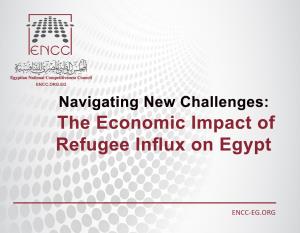Navigating New Challenges: The Economic Impact of Refugee Influx on Egypt

Navigating New Challenges: The Economic Impact of Refugee Influx on Egypt
Introduction
In recent years, Egypt has experienced a significant increase in refugee inflows, a consequence of geopolitical upheavals in neighboring regions, including the civil war in Sudan and the recent conflict in Gaza. This influx, while underscoring Egypt's role as a place of refuge, poses multifaceted challenges, especially in the context of the nation's ongoing economic reforms and endeavors towards sustainable development. This article aims to explore the economic implications of this burgeoning refugee population, shedding light on the urgency for comprehensive strategies and collaborative efforts.
This situation, while not new, presents an array of economic challenges and opportunities against the backdrop of Egypt’s own economic ambitions and constraints. The Egyptian National Competitiveness Council (ENCC), committed to enhancing Egypt's economic competitiveness and sustainability, recognizes the urgency of addressing the economic impacts of this refugee influx
Current Situation
As a nation historically known for its hospitality, Egypt has opened its doors to millions of refugees from various countries over the years. However, the recent escalation in regional conflicts has led to an unprecedented surge in refugee numbers, exerting additional pressure on the country’s resources, infrastructure, and public services. Amidst navigating its economic challenges, including inflation and unemployment, Egypt now faces the task of integrating this vulnerable population into its economic fabric.
Economic Implications
Labor Market:
The influx of refugees has a twofold impact on the labor market. While refugees contribute to the labor force, offering diverse skills and labor, there's a competing interest with local workers, particularly in low-skilled sectors. This competition, if not managed carefully, could strain relations and exacerbate unemployment rates.
Demand for Basic Goods:
An increase in population invariably leads to heightened demand for basic goods and services. While this can stimulate local markets and production, it also poses a risk of inflationary pressures, especially in communities hosting large numbers of refugees. Such dynamics necessitate careful monitoring and response to maintain economic stability.
Public Services:
Education, healthcare, and housing services face increased demand from the refugee population. Without adequate support and expansion, these services could be stretched thin, impacting both refugees and host communities.
Opportunities for Growth:
Amidst these challenges, the refugee influx also presents opportunities. By integrating refugees into the economy, Egypt can leverage a wider pool of talents and labor. Furthermore, international aid and grants aimed at refugee support can be channeled towards infrastructure development, education, and healthcare, benefiting the broader population.
The Need for Concerted Efforts
To navigate the economic impact of refugee inflows effectively, a multi-faceted approach is essential. Collaboration with international organizations, non-governmental entities, and the private sector can provide the resources and innovation needed for integration strategies. Policies fostering an inclusive labor market, entrepreneurship among refugees, and access to education and vocational training are pivotal.
Conclusion
The increased refugee inflows pose both challenges and opportunities for Egypt’s economy. By adopting a proactive, inclusive, and collaborative approach, the nation can not only mitigate the economic pressures but also harness the potential for growth and development. It’s a complex journey, but with concerted efforts, Egypt can set an exemplary model of economic resilience and social solidarity in the face of new challenges.


